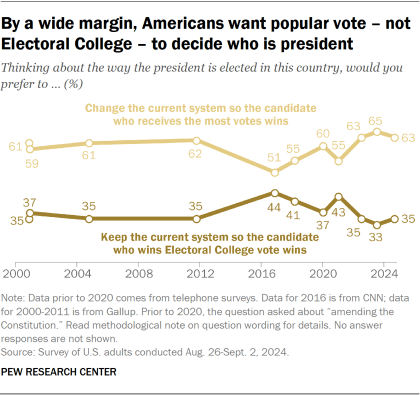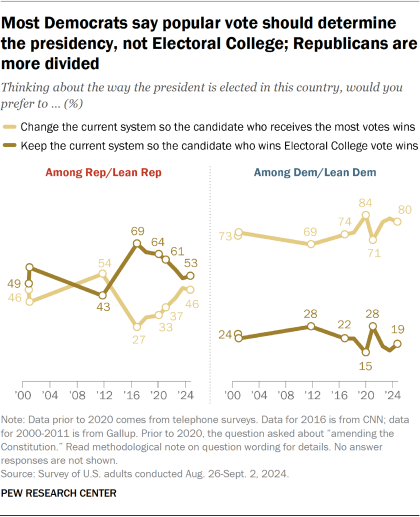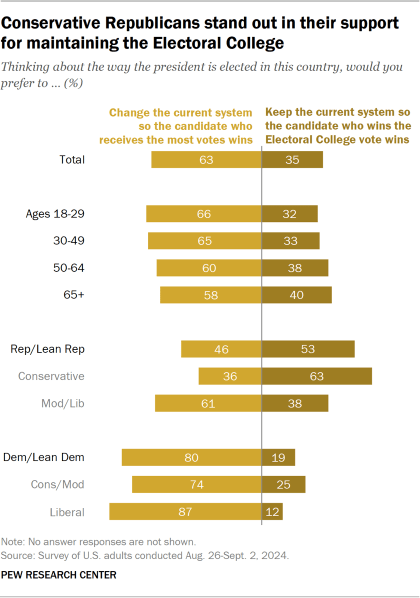As has been the case for over 200 years, the Electoral College will determine the outcome of the U.S. presidential race this fall. Yet most Americans have long supported moving away from this system.
In 2000 and 2016, the winners of the popular vote lost their bids for U.S. president after receiving fewer Electoral College votes than their opponents. To continue tracking how the public views the U.S. system for presidential elections, we surveyed 9,720 U.S. adults from Aug. 26 to Sept. 2, 2024.
Everyone who took part in the current survey is a member of Pew Research Center’s American Trends Panel (ATP), an online survey panel that is recruited through national, random sampling of residential addresses. This way nearly all U.S. adults have a chance of selection. The survey is weighted to be representative of the U.S. adult population by gender, race, ethnicity, partisan affiliation, education and other categories. Read more about the ATP’s methodology.
Here are the questions used for this analysis, along with responses, and its methodology.
The Electoral College allocates a number of electors based on how many senators and representatives each state has in Congress (plus three electors for the District of Columbia, for a total of 538). Most states award all of their electoral votes to the candidate who wins that state.
More than six-in-ten Americans (63%) would instead prefer to see the winner of the presidential election be the person who wins the most votes nationally. Roughly a third (35%) favor retaining the Electoral College system, according to a Pew Research Center survey of 9,720 adults conducted Aug. 26-Sept. 2, 2024.

The Electoral College is always in focus during presidential elections. But a recent – as yet unsuccessful – effort to change how Nebraska awards its electoral votes has highlighted the prospect of a narrow Electoral College victory for either candidate in an extremely close race.
Related: In Tied Presidential Race, Harris and Trump Have Contrasting Strengths, Weaknesses
As has been the case for more than two decades, there are wide partisan differences in attitudes about the Electoral College:
- Eight-in-ten Democrats and Democratic-leaning independents favor replacing the Electoral College with a popular vote system.
- Republicans and Republican leaners are more evenly divided: 53% favor keeping the Electoral College, while 46% would prefer to replace it.
Focus on the Electoral College
In 48 states and D.C., the candidate who receives the most votes in that state is awarded all of its electoral votes.
Nebraska and Maine have a different approach, allocating two electoral votes to the candidate who wins the most votes statewide and one to the winner of each congressional district. Some Republicans have been pressing to change Nebraska’s rules so that the statewide winner gets all five of its electoral votes. This would likely work to former President Donald Trump’s advantage, given Nebraska’s consistent support of GOP presidential candidates.
A candidate must win a majority of the 538 electoral votes to become president. If no candidate wins a majority, the election outcome is decided by the U.S. House of Representatives, with each state’s delegation casting one vote.
Under the current electoral system in the United States, the winner of the popular vote may not secure enough Electoral College votes to win the presidency.
- This occurred in both the 2000 and 2016 elections. George W. Bush and Donald Trump, respectively, won these elections with clear Electoral College victories, but they did not win the most votes nationwide.
- In 2020, while President Joe Biden won the popular vote by more than 7 million votes, his Electoral College victory was decided by fewer than 50,000 votes in a few close states.
- As a result of the Electoral College system, there is outsize attention to outcomes in a handful of battleground states. This year, those battlegrounds include Arizona, Georgia, Michigan, Nevada, North Carolina, Pennsylvania and Wisconsin.
Partisan views of the Electoral College over time

Since the 2000 election, two-thirds or more Democrats have backed moving to a popular vote system.
Republicans remain fairly divided today, with 46% in favor of moving to a popular vote system.
Republicans were less supportive of this change following Trump’s 2016 win. In November of that year, in the wake of Trump’s Electoral College victory and popular vote loss, just 27% of Republicans supported a popular vote system.
Party and ideology
There are only modest differences by ideology on this question among Democrats:

- 87% of liberal Democrats and 74% of conservative and moderate Democrats say they would prefer presidents to be elected by popular vote.
Ideological differences are wider among Republicans:
- 63% of conservative Republicans prefer keeping the current system.
- In contrast, 61% of moderate and liberal Republicans (who are a much smaller share of the Republican coalition) say they support a popular vote for president.
Age
Majorities across all age groups support changing the system. However, adults younger than 50 are somewhat more supportive of this than those ages 50 and older (66% vs. 59%).
Note: This is an update of a post previously published in 2021, 2022 and 2023.
In January 2020, Pew Research Center ran a survey experiment that asked this question in two slightly different ways. One used the language that we and other organizations had used in prior years, with the reform option asking about “amending the Constitution so the candidate who receives the most votes nationwide wins the election.” The other version asked about “changing the system so the candidate who receives the most votes nationwide wins the election.” The January 2020 survey revealed no substantive differences between asking about “amending the Constitution” and “changing the system.”
We conducted this experiment in large part because reforming the way presidents are selected does not technically require amending the Constitution. The National Popular Vote Interstate Compact, for example, could theoretically accomplish it without a constitutional amendment. Since there was no substantive difference in the survey results between the two question wordings, we have adopted the revised wording, which references “changing the system.”
